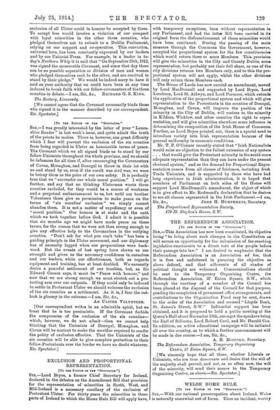EXCLUSION AND PROPORTIONAL REPRESENTATION.
[TO TIM EDITOR Or TER "SPECTATOZ...]
Sin,—Lord Bryce, a former Chief Secretary for Ireland, declared in the debates on the Amendment Bill that provision for the representation of minorities in South, West, and Mid-Ireland is a necessary corollary of the exclusion of Protestant Ulster. For thirty years the minorities in those parts of Ireland to which the Home Rule Bill will apply have, with temporary exceptions, been without representation in any Parliament, and had the latter Bill been carried in its original form the disfranchisement of these minorities would have been continued. During the passing of the main measure through the Commons the Government, however, accepted the proportional system for the few constituencies which would return three or more Members. This provision will give the minorities in the City and County Dublin some representation, but probably not their full share, as one of the city divisions returns two Members only, and to this the pro- portional system will not apply, whilst the other divisions will only return three Members each.
The House of Lords has now carried an amendment, moved by Lord MacDonnell and supported by Lord Bryce, Lord Loreburn, Lord St. AMwyn, and Lord Parmoor, which extends the application of the proportional system and which will give representation to the Protestants in the counties of Donegal, Monaghan, and Cavan, will improve the position of the minority in the City of Dublin, will restore to the minority in Kildare, Wicklow, and other counties the right to repre- sentation, and will give minorities elsewhere some influence in determining the composition of the Irish House of Commons. Further, as Lord Bryce pointed out, there is a special need to introduce variety into Irish representation because of the general uniformity in economic conditions.
Mr. T. P. O'Connor recently stated that "Irish Nationalist. would raise no objection to the fullest extension of any system . . . that would give the Protestant minority in the south more adequate representation than they can have under the present electoral system," and as the demand for Proportional Repre- sentation comes from all classes of Irishmen, including Irish Trade Unionists, and is supported by those who have had long experience in Irish administration, it is hoped that members of Parliament on both sides of the House will support Lord MacDonnelrs amendment, the object of which is to give effect to Mr. Redmond's declaration that he desires to see all classes represented in the Irish Parliament.—I am,






































 Previous page
Previous page